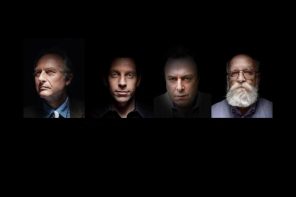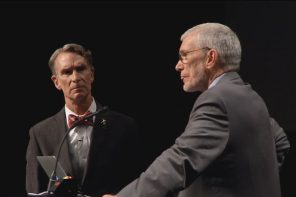In 2014, NASA gave $1.1 million to the Center of Theological Inquiry, an independent institution “rooted in Christian theology.” The grant supports an initiative to study “the societal implications of astrobiology.”
Surprisingly, it took more than a year for anyone to complain.
The potential issue here is obvious: NASA is a government agency. The Center of Theological Inquiry is, well, a center of theological inquiry—an institution that seemingly has a religious, and specifically Christian, orientation. At least in theory, the government is barred from sponsoring religious activities. And doing theology about extraterrestrials does sound kind of religion-y.
Earlier this month, the Freedom From Religion Foundation asked NASA to withdraw the grant. In an interview with RD, the Foundation’s staff attorney, Andrew Seidel, suggested that they might sue.
Seidel probably doesn’t have a viable case. But the relationship between NASA and CTI poses a fascinating set of questions, with implications that go beyond a single grant: what is the place of theology in the public sphere? Is theology inherently religious? When should scientific inquiry overlap with religious thinking? And why does NASA care about the societal implications of astrobiology, anyway?
Not just Roswell
Let’s get a key term straight here: astrobiology involves studying the origins, conditions, and scope of life in the universe. It does not involve little green men, and, to the best of my knowledge, it has nothing to do with Roswell. NASA has an entire Astrobiology Program—they’re the ones who awarded CTI the grant—that does things like study the origins of life on earth, look at extremophiles, and analyze samples brought back from space.
These kinds of questions can sound abstract, but they’re part of basic research—scientific work that addresses foundational questions, but that doesn’t have immediate or obvious applications. Funding for basic research can occasionally upset Congressional Republicans or generate catchy headlines for Fox News, but it’s an important part of science, and it can yield huge breakthroughs.
In the case of astrobiology, all these Big Questions can pull scientists into a speculative-philosophical space that sounds like the domain of the humanities or even, yes, theology. What, exactly, is life? What does it mean to be alive? Where do we draw the line between the human and the alien? What are the possibilities for sentient life in other places? How would we relate to that alien sentience, if it turned up tomorrow? How would that discovery change humanity’s sense of our place in the universe?
In general, there are two ways to slice up astrobiology-and-society questions. Some are consequence-oriented: what would happen to politics/society/the economy/religion/etc. if NASA announced that it had made contact with an alien civilization, or at least had found some fossilized microbes on Mars? Other question are theory-oriented: how does the possibility of extraterrestrial life force people to think differently about sentience, human worth, the importance of Earth, or God?
NASA seems to think these are serious concerns. “Astrobiology is expected to play a large part in future politics, economic life, and the human self-understanding provided by various disciplines including, but not limited to: theology, philosophy, and the arts,” NASA explained, somewhat cryptically, in a statement to RD. (The agency did not make any officials available for interview, and Mary Voytek, who runs the Astrobiology Program, did not respond to an interview request).
Since 1998, part of the Astrobiology Program’s role has been to address the societal implications of the field, mostly through a series of initiatives at the Library of Congress (although there’s also an astrobiology-themed, NASA-funded student debate competition. Most recent topic: “Resolved: An overriding ethical obligation to protect and preserve extraterrestrial microbial life and ecosystems should be incorporated into international law.”) The Library has a Chair in Astrobiology and hosts dialogues about astrobiology-and-society issues.
Robin Lovin, a prominent Methodist theologian and a senior research fellow at CTI, had been involved in some of the Library of Congress dialogues. At some point, NASA approached the CTI about applying for a grant to host an initiative studying astrobiology and society.
In the fall of 2014, NASA awarded CTI $1.1 million to start a two year-long Inquiry on the Societal Implications of Astrobiology. That grant was followed by a $1.7 million donation from the John Templeton Foundation. “The aim of this inquiry is to foster theology’s dialogue with astrobiology on its societal implications, enriched by the contribution of scholars in the humanities and social sciences,” CTI director William Storrar said in announcing the NASA grant that May.
CTI works on a distinctive model: each year, it invites a cohort of scholars to spend a year at the Center, which is located in Princeton, N.J. While there, they pursue independent research projects and hold discussions around a common theme. For the astrobiology inquiry, scholars were invited to apply if they were “open to new ways of thinking” on questions like “If there are many different forms of life…how would philosophy relate these diverse forms life to one another and establish the limits of what it means to be ‘alive’?” or “How might the world’s religions respond to the discovery of life on other planets?”
CTI is taking two cohorts of scholars for the astrobiology program—one group is just wrapping up its year; another will be in residence from 2016-2017. The majority of the scholars are Christian theologians, but there are exceptions. For example, Susan Schneider, a philosopher and cognitive scientist at the University of Connecticut, is working on a project about superintelligence and the human mind.
“‘What is life?’ is both a physical and a metaphysical question. So is ‘What is the disribution and future of life?’” said NASA-funded biologist Frank Rosenzweig in an email. Rosenzweig, a professor at Georgia Tech who is part of CTI’s incoming cohort, said his job will be “to keep science front and center in all our discussions” while he works on a few scientific projects and oversees his lab.
Lovin emphasized that the scholars will focus on “the way the science relates to society, the humanities, and religious questions.” Lovin emphasized that the inquiry was more concerned with questions of science and society than with specifically religious concerns. “What we want to encourage is the kind of thinking in theology that sees the political or the social or the natural order as whole,” Lovin said.
I asked Lovin why it was worth dealing with such abstract questions. “When we think about the long-term human future, we have to ask how we’re going to organize ourselves as a society,” he said. “This seems to me to be an imperative for the future at a time in history when we as a species have an enormous impact on what the future of life on the planet is going to be.”
Are the walls tumbling down?
When the Freedom From Religion Foundation puts your phone call on hold, you don’t hear muzak. Instead, the phone system plays a homegrown jingle featuring lines like “Everyone is tired of your piety / get off your knees and get to work” and “We’ve got to fight the battle of church and state / or the walls come tumbling down.” The receptionist told me that FFRF co-president Dan Barker, a former evangelical preacher and occasional atheist singer-songwriter, had rewritten the words to a devotional song.
The hold music was playing itself through a second time when FFRF attorney Seidel picked up. I asked him about the CTI program. “I think it’s very clear that they’re a Christian-oriented theological institute,” Seidel said. He argued that NASA’s grant to CTI violates all three parts of the Lemon test, the constitutional test used to determine whether a government action violates the Establishment Clause of the First Amendment: it doesn’t have “a secular legislative purpose”; its primary effect advances religious practice; and it represents an “excessive entanglement” of religion and state.
I ran this argument by Bruce Ledewitz, a dean and professor at Duquesne University School of Law who studies religion, secularism, and constitutional law. Ledewitz wasn’t convinced that a program like CTI’s would violate all the prongs of Lemon. In particular,“NASA has a secular purpose for studying the effect of the discovery of extraterrestrial life in all of its aspects,” he said. But, Ledewitz said, the grant is “a good example of entanglement.” In that sense, Seidel’s case would have merit, in Ledewitz’s opinion.
But that doesn’t mean the FFRF will actually get anywhere, should it decide to sue. In today’s courts, said Ledewitz, entanglement simply “doesn’t cut it any more.” Unless the government is actively requiring citizens to do something, courts today tend to be sympathetic toward public expressions of religion. “If he sues, he won’t have standing,” said Ledewitz. “Not on the constitutional claim.”
In its statement, NASA explained that it had received the letter from the FFRF and was “thoroughly reviewing the grant awarded to CTI. Until that review is complete, NASA will refrain from responding to FFRF’s claims.”
Asked about the FFRF letter, William Storrar, the director of CTI, said that “we are not a religious organization or confessional body” (The letter from the FFRF states, incorrectly, that CTI is “part of a Presbyterian seminary”). Storrar said that the application process for fellows is entirely academic and does not include a religion requirement, and that CTI has hosted scholars from multiple religious traditions, as well as atheists and agnostics. His message, essentially, was that CTI was doing the kind of broad-base, broad-access educational work that all sorts of publicly-funded institutions engage in, rather than serving a specifically Christian set of needs. “We operate just like any other educational institution,” he said.
Leprechauns and Unicorns
These questions of church and state are challenging, in part, because it can be so hard to define the boundary between secular and religious questions. In our conversation, Ledewitz argued that it’s virtually impossible to legislate religious thinking out of publicly funded scholarship. After all, even devotedly secular people understand many different concepts—about human worth and dignity, for example—in terms that owe a clear debt to religious traditions, or at least to non-materialist ways of looking at the world. Ledewitz’s question for the FFRF was, essentially: where do you stop?
Earlier, in my conversation with Seidel, I had brought up a similar point: should the government withdraw support from any kind of philosophical enterprise that isn’t rooted in strictly empirical claims? Seidel stuck to his main point. “At its most basic, you’re still stuck with the problem that the government is funding theological inquiry,” he said. “That just can’t happen.”
In some ways, the question here boils down to something like: What the heck is theology? Is it a specifically Christian pursuit? Does it only have applications for religious people?
In its narrowest definition, theology is the study of God. Unlike the field of religious studies—which, in principle, studies religious phenomena from a secular perspective—theologians typically start with certain premises about the nature or existence of God. For Seidel, this is akin to myth-making. Theology, he said, “is like arguing over the average height of leprechauns or the color of unicorn hair.”
Jonathan Sheehan, a historian of early modern Europe who directs the Berkeley Center for the Study of Religion, was skeptical of Seidel’s definition. “I have very little sympathy for that position,” he said. “I just don’t think it’s thought out.” Sheehan points out that most people reckon with concepts that are unprovable or indefinable (such as the experience of love), and that many people orient their lives around texts that wouldn’t meet the standards of factual nonfiction, whether those texts are literary or scriptural.
In a recent essay for RD titled “Why We Should Teach Theology in the Public University,” Sheehan argues for a definition of theology that goes beyond Christian traditions, and that includes all the “conceptual commitments and modes of inquiry that together have enabled communities to investigate and understand the world in religious terms.” In this view, theology is a kind of pluralistic discussion that welcomes all kinds of premises and belief commitments as it tackles shared questions. It’s not just haggling over dogma, or defining the nature of God.
I asked Sheehan why, if NASA wanted to address certain big questions about astrobiology and society, they should turn to theologians, instead of asking philosophers or sociologists or religious studies scholars to come up with some answers.
Sheehan answered with a question: “Why not?” he asked. “I’m in favor of the widest possible group of interlocutors when looking at a question as interesting and important as that [posed by astrobiology].”
Perhaps the most relevant question here is not whether some members of an initiative start from religious premises or non-religious premises, but whether every person, regardless of background, would feel welcome at the table—or whether the discussion is inherently limited only to people with certain religious commitments.
When I spoke with Storrar, the CTI director, he acknowledged that “historically theology is a Christian tradition.” But he took pains to emphasize that “we are very committed to interreligious scholarship” and that they wanted to bring more voices to the conversation.
Still, the cohorts of scholars in CTI’s astrobiology inquiry are fairly homogeneous. Of the 24 scholars, at least 18 work for a Christian institution, have at least one degree in Christian theology, or both; none of the 24 seem to have a professional role in a non-Christian tradition. Nor does NASA seem to be underwriting efforts to tackle these same questions from other perspectives; other than certain Library of Congress dialogues and symposia, the CTI program seems to be fairly unique.
The larger issue here isn’t going away: scientists today are broaching questions that could be described, in technical language, as totally mind-bending. Space exploration poses new ethical quandaries; physicist are discussing multiverses and other category-blurring edge-of-reality topics; biologists are creating ways to synthesize organisms and entirely rewrite the map of the human body. Like it or not, new research is going to force our society to confront questions that sound metaphysical, and to have new kinds of debates over the nature and extent of humanness.
And, as always, questions of access will remain: who will get a place at the table? Who will get a chance to speak? Which voices will be suppressed? And which will be elevated?
Also on The Cubit: Why cartoons are the 21st century’s great metaphysical playground
Follow The Cubit, RD’s religion-and-science portal, @TheCubit





